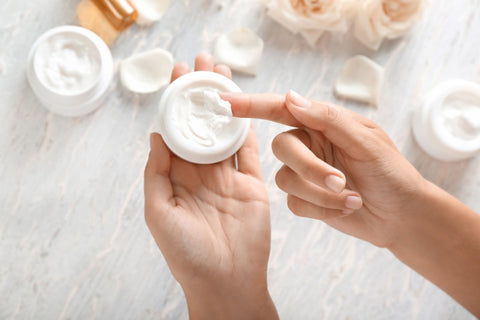Aging is a natural part of life, and while we cannot stop time, we can certainly take steps to maintain the health and appearance of our skin as we age. The biological processes of skin aging are complex, involving both intrinsic (internal) and extrinsic (external) factors. By understanding these processes, we can better appreciate how organic skincare products can play a crucial role in mitigating the effects of aging and promoting youthful, radiant skin.
The Biological Processes of Skin Aging
Intrinsic Aging

Intrinsic aging, also known as chronological aging, is the natural aging process that occurs over time. This process is largely determined by our genetic makeup and involves several key changes in the skin:
Reduction in Collagen Production: Collagen is a protein that provides structure and strength to the skin. As we age, our bodies produce less collagen, leading to a loss of skin firmness and the development of fine lines and wrinkles.
Decrease in Elastin: Elastin is another protein that allows the skin to remain flexible and elastic. With age, elastin fibers degrade, resulting in sagging and less resilient skin.
Diminished Cell Turnover: The rate at which new skin cells are produced and old cells are shed slows down with age. This can cause the skin to appear dull and uneven.
Reduced Hyaluronic Acid: Hyaluronic acid is a naturally occurring substance that helps keep the skin hydrated and plump. Aging reduces the levels of hyaluronic acid, leading to dryness and a loss of volume.
Thinning of the Epidermis: The outermost layer of the skin, the epidermis, becomes thinner and more fragile over time, making the skin more susceptible to damage.
Extrinsic Aging

Extrinsic aging is caused by external factors and lifestyle choices. It often accelerates the natural aging process and can result in more pronounced skin aging. Key contributors to extrinsic aging include:
Sun Exposure: Ultraviolet (UV) radiation from the sun is a major cause of premature aging, known as photoaging. UV rays can damage collagen and elastin fibers, leading to wrinkles, pigmentation changes, and an increased risk of skin cancer.
Pollution: Environmental pollutants can generate free radicals, unstable molecules that damage skin cells and contribute to aging.
Smoking: Tobacco smoke contains chemicals that can degrade collagen and elastin, reducing blood flow to the skin and causing wrinkles.
Diet and Nutrition: Poor nutrition can affect skin health. A diet lacking in essential vitamins and antioxidants can lead to premature aging.
Stress and Lack of Sleep: Chronic stress and insufficient sleep can accelerate aging by increasing the production of cortisol, a hormone that can break down collagen.
How Organic Products Can Mitigate Skin Aging
Organic skincare products offer a natural and effective approach to combating the signs of aging. Here’s how they can help:
Natural Antioxidants

Organic products are often rich in antioxidants, which are essential for neutralizing free radicals. Free radicals are highly reactive molecules that can damage skin cells and accelerate aging. Ingredients like green tea extract, vitamin C, and vitamin E are powerful antioxidants that protect the skin from oxidative stress and promote a youthful appearance.
Gentle on the Skin
Organic skincare products typically contain fewer harsh chemicals and synthetic ingredients, making them gentler on the skin. This is particularly important for aging skin, which can become more sensitive and prone to irritation. Ingredients like chamomile, aloe vera, and calendula have soothing properties that help calm and protect the skin.
Boosting Collagen and Elastin Production
Many organic ingredients are known to stimulate collagen and elastin production, helping to maintain skin firmness and elasticity. For example, retinol (derived from vitamin A) and peptides are commonly used in organic anti-aging products to promote collagen synthesis and reduce the appearance of wrinkles.

Hydration and Moisture Retention
Maintaining adequate hydration is crucial for aging skin. Organic products often contain natural humectants like hyaluronic acid, glycerin, and honey, which attract and retain moisture in the skin. These ingredients help to plump the skin, smooth out fine lines, and prevent dryness.
Protection from Environmental Damage
Organic skincare products can provide a protective barrier against environmental aggressors. Ingredients like shea butter, jojoba oil, and avocado oil are rich in essential fatty acids that strengthen the skin’s natural barrier, shielding it from pollution and harsh weather conditions.
Supporting Skin Regeneration
Aging skin benefits from ingredients that support cell turnover and regeneration. Organic exfoliants like alpha hydroxy acids (AHAs) derived from fruits and plants can gently remove dead skin cells, revealing fresher, more youthful skin beneath. Additionally, botanical extracts like rosehip oil and sea buckthorn oil are packed with vitamins and essential fatty acids that promote skin repair and regeneration.
Embrace Organic Skincare
Understanding the biological processes of skin aging allows us to make informed choices about our skincare routines. Organic skincare products offer a natural and effective way to address the signs of aging, providing a wealth of benefits without the harsh chemicals found in many conventional products. By incorporating organic products rich in antioxidants, hydrating ingredients, and collagen-boosting compounds, we can help mitigate the effects of aging and enjoy healthier, more radiant skin for years to come.
Embracing an organic skincare regimen not only benefits your skin but also supports a more sustainable and environmentally friendly approach to beauty. As we age gracefully, let’s choose products that nourish and protect our skin while respecting the planet.

